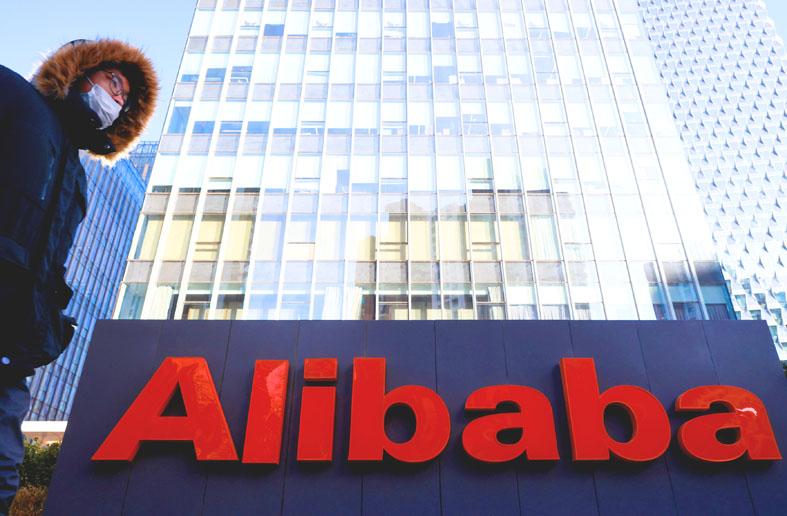China’s largest e-commerce group Alibaba Group Holding Ltd (阿里巴巴) yesterday said it is appointing a new chief financial officer and reorganizing its e-commerce businesses amid a regulatory crackdown in the technology industry.
Toby Xu (徐宏) is to succeed Maggie Wu (武衛) as its new CFO from April 1 next year, the company said in a statement.
Xu joined Alibaba from PricewaterhouseCoopers LLP three years ago and was appointed deputy group CFO in July 2019.

Photo: Reuters
Wu, who has been Alibaba’s CFO since 2013 and has helped lead three Alibaba-related company listings, would continue to serve as an executive director on Alibaba’s board.
She would also remain as a partner in the Alibaba Partnership — a group of senior executives who have the right to nominate a simple majority of Alibaba’s board of directors.
“We are focused on the long-term, and succession within our management team on every occasion is always in the service of ensuring Alibaba will be stronger and better positioned for the future,” Alibaba chairman and chief executive officer Daniel Zhang (張勇) said.
Separately, Alibaba said that it would be creating an international digital commerce team to handle its e-commerce businesses in international markets.
A China digital commerce team would be in charge of e-commerce operations inside China, a post on the company’s Alizila news hub said.
The Hangzhou-based firm was fined a record US$2.8 billion for antitrust contraventions and is under scrutiny as regulators step up oversight of the technology industry at a time when the economy is slowing.
Last month, Alibaba cut its sales outlook for the year amid mounting competition from rivals such as Pinduoduo Inc (拼多多). It expects growth for this year to be the slowest since it listed on the New York Stock Exchange in 2014.
Alibaba’s New York stock price has plunged more than 50 percent over the past 12 months. The company’s Hong Kong-traded shares were down 4.9 percent yesterday.

TECH BOOST: New TSMC wafer fabs in Arizona are to dramatically improve US advanced chip production, a report by market research firm TrendForce said With Taiwan Semiconductor Manufacturing Co (TSMC, 台積電) pouring large funds into Arizona, the US is expected to see an improvement in its status to become the second-largest maker of advanced semiconductors in 2027, Taipei-based market researcher TrendForce Corp (集邦科技) said in a report last week. TrendForce estimates the US would account for a 21 percent share in the global advanced integrated circuit (IC) production market by 2027, sharply up from the current 9 percent, as TSMC is investing US$65 billion to build three wafer fabs in Arizona, the report said. TrendForce defined the advanced chipmaking processes as the 7-nanometer process or more

China’s Huawei Technologies Co (華為) plans to start mass-producing its most advanced artificial intelligence (AI) chip in the first quarter of next year, even as it struggles to make enough chips due to US restrictions, two people familiar with the matter said. The telecoms conglomerate has sent samples of the Ascend 910C — its newest chip, meant to rival those made by US chipmaker Nvidia Corp — to some technology firms and started taking orders, the sources told Reuters. The 910C is being made by top Chinese contract chipmaker Semiconductor Manufacturing International Corp (SMIC, 中芯) on its N+2 process, but a lack

NVIDIA PLATFORM: Hon Hai’s Mexican facility is to begin production early next year and a Taiwan site is to enter production next month, Nvidia wrote on its blog Hon Hai Precision Industry Co (鴻海精密), the world’s biggest electronics manufacturer, yesterday said it is expanding production capacity of artificial intelligence (AI) servers based on Nvidia Corp’s Blackwell chips in Taiwan, the US and Mexico to cope with rising demand. Hon Hai’s new AI-enabled factories are to use Nvidia’s Omnivores platform to create 3D digital twins to plan and simulate automated production lines at a factory in Hsinchu, the company said in a statement. Nvidia’s Omnivores platform is for developing industrial AI simulation applications and helps bring facilities online faster. Hon Hai’s Mexican facility is to begin production early next year and the

Who would not want a social media audience that grows without new content? During the three years she paused production of her short do-it-yourself (DIY) farmer’s lifestyle videos, Chinese vlogger Li Ziqi (李子柒), 34, has seen her YouTube subscribers increase to 20.2 million from about 14 million. While YouTube is banned in China, her fan base there — although not the size of YouTube’s MrBeast, who has 330 million subscribers — is close to 100 million across the country’s social media platforms Douyin (抖音), Sina Weibo (新浪微博) and Xiaohongshu (小紅書). When Li finally released new videos last week — ending what has